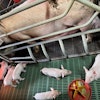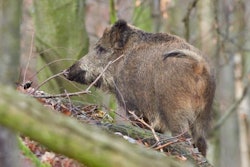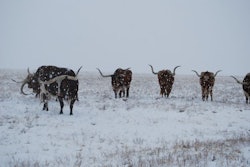
Following confirmed outbreaks of African swine fever (ASF) across several regions of the Philippines, others are taking active measures to keep the infection out.
Since the first cases of African swine fever (ASF) were confirmed in the Philippines in July 2019, the disease has spread sporadically.
According to the World Organisation for Animal Health (OIE), more than 300 outbreaks are considered to be ongoing. Direct losses of pigs exceed 342,000. With many restrictions in place on the movement of pork around the island nation, there are many challenges in maintaining a balance between pork supply and demand.
With pork prices rising ever higher, the Department for Agriculture in one region (Soccsksargen) is among the first to set a maximum price for live pigs at the farm gate. This is PHP144 (US$2.96) per kilo, reports Philippine News Agency (PNA).
Previously, market prices in this region in the south of the island of Mindanao were reported to be above PHP300 per kilo of pork, despite an earlier price cap.
This region has plentiful supplies of pork, according to the regional director, so there is no reason for retailers and other vendors to raise their prices. To help areas of the country where supplies are short, this region has increased its shipments to Metro Manila and Luzon in recent weeks.
In the Philippines’ Western Visayas area, which has not experienced ASF outbreaks, the main focus is keeping the infection out. PNA reports that quarantine checkpoints are being set up on the borders of the province of Antique. These are scheduled to be in operation next week. To enter the province, all consignments of pig meat and products will need appropriate certification that they are free of ASF.
This move comes after recent confirmation of an ASF outbreak in the neighboring Bicol region.
On the island of Mindanao, the authorities in the Caraga region have increased monitoring for ASF after outbreaks were confirmed in the neighboring province of Misamis Oriental (North Mindanao region). At the borders, live pigs and pork products are being monitored at quarantine stations, and ASF-free certification is checked. Also, all vehicles crossing the border have to travel through a wheel bath of disinfectant.
Update on first ASF outbreak in Hong Kong
After detection of the ASF virus in more animals at the premises, all pigs at a farm in Hong Kong have been culled.
When the presence of the ASF virus was confirmed, the Hong Kong agriculture department arranged for a partial cull of pigs in just one house at the Yuen Long farm. According to the agency’s latest report to the World Organisation for Animal Health (OIE), some pigs in other building at the location subsequently tested positive for the ASF virus. So all 4,000 pigs at the licensed premises have or will be destroyed.
Testing at the three neighboring pig farms has revealed no more positive cases. As a result, movement restrictions around those premises have been lifted.
ASF was detected in Hong Kong-raised pigs for the first time this month. Initially, around 240 pigs were culled after a few animals tested positive for the virus in Yuen Long in the western New Territories.
More ASF among South Korean wild boar
Over the past week, South Korea’s agriculture ministry has officially reported ASF in 24 more wild boar.
According to the latest report to the OIE, these were found during the second week of February. The majority of the animals were found in counties where previous cases have been reported in the northern provinces of Gyeonggi and Gangwon. However, one animal was discovered outside this area — in the Gangwon provincial county of Gangneung.
The latest cases bring the country’s total since the start of 2021 to 74.
The ASF virus was first detected in South Korea in September 2019. Since then, the wild boar population has been heavily impacted. As of January 31, FAO puts the number of wild boar affected by ASF in South Korea at 1,001.
One more wild boar infected in Russia’s Far East
Last week, one wild boar in the Far Eastern federal district has tested positive for the ASF virus. According to the official report to the OIE, the animal was found in Khabarovsk krai.
Multiple previous cases have been detected in this region, including one earlier this year. Based on Russian agriculture ministry reports, the latest case brings the region’s total so far this year to 11. Primorsky krai was the location of nine of these infected wild boar.
Further ASF losses reported in northern Uganda
From the 120 deaths reported one week ago, pig mortalities have risen to an estimated 600.
These animals showed signs typical of ASF, according to Uganda’a Independent. Veterinary investigations are underway, and local pig owners will be offered training about the potential dangers of the disease, and how to prevent its spread. According to this source, all the animals have been consumed.
Affected animals were in one county (Labongo Akwam) in the district of Kitgum in the north of Uganda. Kitgum shares an international frontier with South Sudan.
This month, ASF was also suspected as the cause of death of between 700 and 1,500 pigs in Otuke district. Like Kitgum, Otuke is located in Uganda’s Northern Region.
2 new outbreaks in South Africa
With the country’s first ASF in the current series confirmed in April 2019, South Africa has been struggling to halt the outbreaks for almost two years. All of the outbreaks so far have been outside the nation’s ASF Control Zone.
This month, two new outbreaks were confirmed by the agriculture department.
In its official reports to the OIE, it outlines one outbreak at a small farm in North West Province. Located in the municipality of JB Marks, the premises had 100 pigs, 13 of which died. Within days, the virus was detected in a backyard herd at Ekurhuleni in Gauteng. There, around 40 pigs died out of a herd of 200 animals. Fate of the remaining animals is not reported.
Latest outbreaks bring South Africa’s total to 36. Losses of pigs are put at just over 15,000, including one commercial herd of around 9,000 in Gauteng province in November 2020.
In recent weeks, cases of ASF have also been reported in the East African state of Tanzania and in Togo in West Africa.
According to the OIE, three other African countries have ongoing ASF outbreaks — Namibia, Nigeria and Zambia.
Over the past two years, ASF has spread around much of Asia, Africa and Europe, disrupting the world pork market. It’s hard to forecast when the global pork prices will normalize again, according to a top executive with Tyson Foods.
View our continuing coverage of the global African swine fever situation.

















